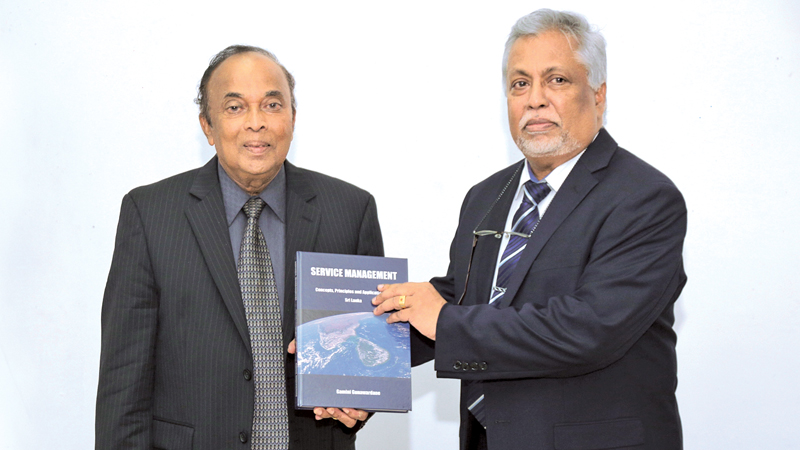The importance of strengthening the Sri Lankan service sector that contributes 62% to the country’s GDP was highlighted by the Social Empowerment and Welfare Ministry's Senior Advisor Dr. Sunil Jayantha Nawaratne.
Dr. Nawaratne made these remarks at the launching of the book titled 'Service Management: Concepts, Principles and Applications for Sri Lanka', written by Professor Gamini Gunawardane.
Prof. Gunawardane has a wide knowledge in operations management, service management, strategic management and health care services management, which he received from California State University at Fullerton and Los Angeles in USA. He also worked closely with the University of Colombo's Institute of Human Resource Advancement, Service Management Unit.
While thanking Professor Gunawardane for publishing a book that gives a comprehensive description about the importance of strengthening the Sri Lankan service sector, Dr. Nawaratne said this is the first time a Sri Lankan produced a book on service management.
“The book has given wide coverage to the development of service sectors around the world, especially in Asian countries including Sri Lanka,” he said.
Dr. Nawaratne also emphasized the need for expanding service management education and training for the younger generation.
He said the younger generation should carry out more research on service management as this is one of the main sectors focusing on the country’s future economy development targets.
Making a brief speech on the speedy development of the Sri Lankan service sector, Prof. Gunawardane said alleconomies are service economies.
He said goods are the distribution mechanism for service provision and goods derive their value through use.
He said marketing services is different from marketing goods and managing service operations has different challenges.
“Although our young students are most likely to be employed in the service sector, their MBA or business degree programmes will not teach them special concepts, principles or methods to manage services.” Prof. Gunawradane further said students should focus attention towards hospitality and tourism, business visitors, exporting services and selling higher education globally in order to increase the service sector further.
He also highlighted about fragmented service management education (FSME) and training and said the Sri Lankan private sector has lots of employees training in customer service.
He said the University of Sri Jayawardanapura (USJP) conducts one course for 12 degree programmes and the University of Colombo has formal degree and diploma programmes for service management.
Meanwhile SLIDA uses one customer service module for its training programmes and CMA has no service management course in its four level structure.
He further said in our country there is no motivation and no structure to methodically promote the awareness and improvement of service management.
“Also we have no mechanisms to form a body of knowledge of best practices, studies, seminars and research in service management,” he said.
He said in addition there are no books and collections of studies in service management (SM) for students, practitioners and researchers. Prof. Gunawardane also said service sector personnel should consult customers to identify their needs, deliver consistent level of service, inform service delivery expectations, solicit feedback from customers, establish a complaints procedure, treat customers fairly and consistently, recognize customer rights and deal with customers in a polite, helpful, open and a professional manner.
Quoting recent research, Prof Gunawardanae said the largest subsectors within the service sector are wholesale and retail trade, transportation, public services, health services, educational services and tourism and hospitality services.
He said there are many reasons to improve service management in Sri Lank as the island is seeking to become a partner with foreign investors and businesses globally. Such firms need highly efficient financial, communication, IT and other business services.



Add new comment